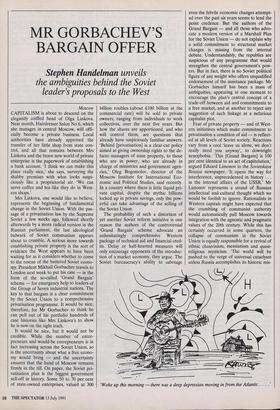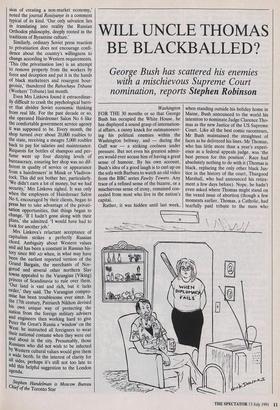MR GORBACHEV'S BARGAIN OFFER
Stephen Handelman unveils
the ambiguities behind the Soviet leader's proposals to the West
Moscow CAPITALISM is about to descend on the elegantly coiffed head of Olga Linkova. Next month, Hairdresser Salon No 6, which she manages in central Moscow, will offi- cially become a private business. Local authorities have already approved the transfer of her little shop from state con- trol, and all that remains between Mrs Linkova and the brave new world of private enterprise is the paperwork of establishing a bank account. 'I think we can make this place really nice,' she says, surveying the shabby premises with what looks suspi- ciously like a proprietorial air. 'We can serve coffee and tea like they do in West- ern shops.'
Mrs Linkova, one would like to believe, represents the beginning of fundamental change in the Soviet Union. With the pas- sage of a privatisation law by the Supreme Soviet a few weeks ago, followed shortly afterwards by a more radical version in the Russian parliament, the last ideological bulwark of Soviet communism appears about to crumble. A serious move towards establishing private property is the sort of evidence the West appears to have been waiting for as it considers whether to come to the rescue of the battered Soviet econo- my. President Mikhail Gorbachev travels to London next week to put his case — in the form of the so-called 'Grand Bargain' scheme — for emergency help to leaders of the Group of Seven industrial nations. The key to that bargain is a clear commitment by the Soviet Union to a comprehensive privatisation programme. It would be nice, therefore, for Mr Gorbachev to think he can pull out of his portfolio hundreds of case histories like Mrs Linkova's to show he is now on the right track.
It would be nice, but it would not be credible. While the number of entre- preneurs and would-be entrepreneurs is in fact increasing across the Soviet Union, so is the uncertainty about what a free econo- my would bring — and the uncertainty ensures that the hand of Moscow remains firmly in the till. On paper, the Soviet pri- vatisation plan is the biggest government sell-off in history. Some 50 to 70 per cent of state-owned enterprises, valued at 300 billion roubles (about £100 billion at the commercial rate) will be sold to private owners, ranging from individuals to work collectives, over the next five years. But how the shares are apportioned, and who will control them, are questions that already have suspiciously familiar answers. `Behind [privatisation] is a clear-cut policy aimed at giving ownership rights to the de- facto managers of state property, to those who are in power, who are already in charge of ministries and government agen- cies,' Oleg Bogomolov, director of the Moscow Institute for International Eco- nomic and Political Studies, said recently. In a country where there is little liquid pri- vate capital, despite the mythic billions locked up in private savings, only the pow- erful can take advantage of the selling of the Soviet Union.
The probability of such a distortion of yet another Soviet reform initiative is one reason the authors of the controversial `Grand Bargain' scheme advocate an unhesitatingly comprehensive Western package of technical aid and financial cred- its. Delay or half-hearted measures will only encourage opponents of the introduc- tion of a market economy, they argue. The Soviet bureaucracy's ability to sabotage even the febrile economic changes attempt- ed over the past six years seems to lend the point credence. But the authors of the Grand Bargain — and all those who advo- cate a modern version of a Marshall Plan for the Soviet Union — do not explain why a solid commitment to structural market changes is missing from the internal debate. Understandably, the republics are suspicious of any programme that would strengthen the central government's pow- ers. But in fact, there is no Soviet political figure of any weight who offers unqualified endorsement of the assistance package. Mr Gorbachev himself has been a mass of ambiguities, appearing at one moment to encourage the plan's central concept of a trade-off between aid and commitments to a free market, and at another to reject any suggestion of such linkage as a nefarious capitalist plot.
Fear of private property — and of West- ern initiatives which make commitment to privatisation a condition of aid — is reflect- ed at all levels of Soviet society. Reactions vary from a cool 'leave us alone, we don't really need you anyway', to downright xenophobia. 'This [Grand Bargain] is 100 per cent identical to an act of capitulation,' argued Eduard Limonov in the Sovietskaya Rossiya newspaper. 'It opens the way for interference, unprecedented in history ... in the internal affairs of the USSR.' Mr Limonov represents a strand of Russian intellectual and cultural thought which we would be foolish to ignore. Rationalists in Western capitals might have expected that the crumbling of communist authority would automatically pull Moscow towards integration with the agnostic and pragmatic values of the 20th century. While this has certainly occurred in some quarters, the collapse of communism in the Soviet Union is equally responsible for a revival of ethnic chauvinism, messianism and quasi- religious mysticism. 'The world will be pushed to the verge of universal cataclysm unless Russia accomplishes its historic mis- `Woke up this morning — there was a deep depression moving in from the Atlantic . . sion of creating a non-market economy,' noted the journal Rossiyanye in a comment typical of its kind. 'Our only salvation lies in translating into reality the Russian Orthodox philosophy, deeply rooted in the traditions of Byzantine culture.'
Similarly, ordinary Soviet press reaction to privatisation does not encourage confi- dence about the country's willingness to change according to Western requirements. `This (the privatisation law) is an attempt to remove property from the workers by force and deception and put it in the hands of black marketeers and resurgent bour- geoisie,' thundered the Rabochaya Tribuna (Workers' Tribune) last month.
Even Mrs Linkova found it extraordinar- ily difficult to crash the psychological barri- er that divides Soviet economic thinking from real life. For the past decade or so, she operated Hairdresser Salon No 6 like the comfortable government service agency it was supposed to be. Every month, the shop turned over about 20,000 roubles to the state, receiving a meagre 5,000 roubles back to pay for salaries and maintenance. Requests for bottles of shampoo and per- fume went up four dizzying levels of bureaucracy, ensuring her shop was no dif- ferent in quality of service or appearance from a hairdressers' in Minsk or Vladivos- tock. This did not bother her, particularly. `We didn't earn a lot of money, but we had security,' Mrs Linkova sighed. It was only when the employees of Hairdresser Salon No 6, encouraged by their clients, began to press her to take advantage of the privati- sation opportunities, that things began to change. 'If I hadn't gone along with their plans,' she admitted. 'I would have had to look for another job.'
Mrs Linkova's reluctant acceptance of capitalism strikes a perfectly Russian chord. Ambiguity about Western values and aid has been a constant in Russian his- tory since 860 AD when, in what may have been the earliest reported version of the Grand Bargain, the merchants of Nov- gorod and several other northern Slav towns appealed to the Varangian (Viking) princes of Scandinavia to rule over them. Our land is vast and rich, but it lacks order,' they said. The Varangian compro- mise has been troublesome ever since. In the 17th century, Patriarch Nikhon devised his own unique way of protecting the nation from the foreign military advisers and engineers then working hard to give Peter the Great's Russia a 'window' on the West: he instructed all foreigners to wear their national costume when they were out and about in the city. Presumably, those Russians who did not wish to be infected by Western cultural values would give them a Wide berth. In the interest of clarity for all sides, perhaps it's still not too late to add this helpful suggestion to the London agenda.
Stephen Handelman is Moscow Bureau Chief of the Toronto Star



















































 Previous page
Previous page